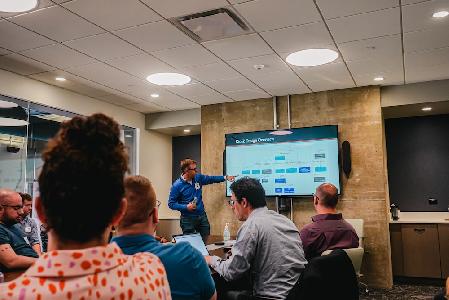Technologists do not all come from collegiate backgrounds.
It’s been well established that with the prevalence of coding bootcamps and plenty of other nontraditional options for learning technical skills, computer science or related degrees are not required to find a job in the field.
But sometimes, they can help. It just depends on the role.
On the Technical.ly Slack recently, nine technologists — many of whom were included on the 2021 RealLIST Engineers for their markets — discussed whether there’s a need for job candidates to have a college degree when pursuing a tech career, and what else should be considered instead.
Join the Technical.ly SlackTheir answers skewed toward “nope,” but there was plenty of room for debate about the nuance of when a degree could be beneficial.
Hard no
Colin Dean, managing director of Pittsburgh-based software community and coworking space Code & Supply, said he believes technologists should be tested on their competency and interviewed to assess their
“productivity and perspective and promise.” Fellow Pittsburgher and BlastPoint CEO Alison Alvarez agreed about screening for competency, noting that “even people with degrees have no idea what they are doing.”
Baltimore-based MindStand Technologies CTO Eric Solender echoed their sentiments: “I think there is a lot of missed opportunity for companies by making that a requirement,” he said.
Solender remembered being in an odd situation as a college freshman. He had already been working professionally for a few years at that point, making his college studies less relevant than his personal experience. Today, he doesn’t believe computer science programs are as beneficial for students who come into them with prior tech knowledge.

Tajh Taylor. (Photo via Linkedin)
Maryland’s Tajh Taylor, the VP of data science and engineering at the Wikimedia Foundation, also doesn’t believe college degrees are necessary for tech jobs.
“Some of the best software engineers I’ve managed or worked with didn’t have one, or had one in an unrelated field (like philosophy),” he said. “But there are things college teaches you, if you’re willing to learn, and most of the good folks I’ve had the fortune to work with managed to pick those things up on their own.”
Yes — sometimes
As Qualytics’ director of software engineering, Dan Dutrow of DC works closely with engineers and believes that college degrees should be necessary depending on their application. On GitHub, it’s tough to show off technical skill for, say, airplane flightpath simulation, which he needed to demonstrate for this first job.

Dan Dutrow. (via Qualytics)
“For research/science applications you need to be able to have the foundation,” he wrote. “In a research lab, you have to rely on the authority of the college/university to build the foundation, and trust GPA to make the assessment of competence — then screen for whether that individual is able to communicate about the projects they completed in their curriculum. The research lab can only sample from the knowledge they’ve acquired, and use that sampling to determine if the individual is likely to have mastered the entire body of knowledge. A comprehensive test for that type of work would be difficult.”
However, when it comes to building web apps, APIs, databases, interfaces and the like, “you don’t need that foundation and can be successful without it,” he said. Nowadays, when Dutrow is interviewing, he focuses less on degree attainment and more on “technical mastery of languages and frameworks, and their passion for learning in that area” — skills that encompass most of the industry.
Baltimore-based AI and machine learning architect Matt Ford agreed with Dutrow and noted that degrees should be required based on the job or tasks at hand, but should not be absolutely required for tech jobs across the board.
What else matters?
Daniel Hunter is a senior frontend engineer at Philly’s Crossbeam and one of those engineers Taylor was describing who had a non-technology background before entering the field. He doesn’t believe having a tech-related college degree is important to have success as a technologist — but non-tech skills do matter.
“It’s more important to get the interview process right,” he said. “I’m biased though; I studied music in college and one of my favorite films is ‘Good Will Hunting.'”

Nico Westerdale. (Courtesy photo)
Fractional CTO Nico Westerdale does not believe having a college degree is necessary to work in tech. He’s also found that companies’ recruitment process for tech jobs has become “commoditized” in order to fill the high number of open tech roles.
After all: Who is driving the Great Resignation? Mid-career tech workers.
“Hiring a full stack mid-level engineer with React and Node JS [skills], for example, it’s simply a numbers game and everyone knows it,” he said. “I have to get a candidate an offer within a week of the first interview, otherwise they’ve gone to another place.”
But scale doesn’t equal quality, and more applicants doesn’t mean everyone has the skills needed for a given role.
“In finding technical leaders for startups, I’ll bring in one person from my network, not twenty resumes,” he said. “It’s much more of a concierge service [and] really understanding the need of the startup and pairing them to someone that will work technically and culturally.”
Graphite GTC VP of Marketing and Sales Byron Druss, based in Marlton, New Jersey, agreed with Westerdale about the value of networking for professionals working to get a tech job.
“Networking and personal relationships remain strongest teaming methods, agreed,” he said. “For other staffing, it seems like the real estate market — put in an offer or it’s gone. And you probably are too late or too low anyway.”
In today’s tech industry, Dean expects senior engineers to have preferred languages, but also be willing to learn new ones, with support from their employers.
“When I was building stuff in Rust and Scala, both were hard to find so I’d take anyone who’d had solid C# or Java experience and teach them Scala or solid C or C++ experience and teach them Rust,” he said. “Companies need to expect a need to train! Learning is a part of the process. We’re not engineers hired to a push a button, we’re essentially artists, authors, and mathematicians all in one.”
Join the Technical.ly Slack Michael Butler is a 2020-2022 corps member for Report for America, an initiative of The Groundtruth Project that pairs young journalists with local newsrooms. This position is supported by the Lenfest Institute for Journalism.Join the conversation!
Find news, events, jobs and people who share your interests on Technical.ly's open community Slack

Philly daily roundup: Student-made college cost app; Central High is robotics world champ; Internet subsidy expiration looms

Philly daily roundup: Earth Day glossary; Gen AI's energy cost; Biotech incubator in Horsham

Philly daily roundup: Women's health startup wins pitch; $204M for internet access; 'GamingWalls' for sports venues


